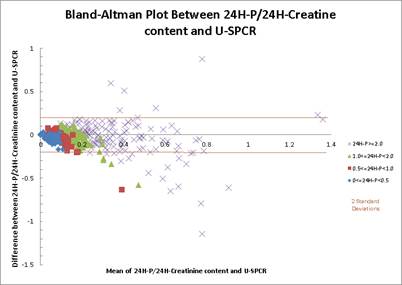Session Information
Date: Tuesday, November 10, 2015
Title: Systemic Lupus Erythematosus - Clinical Aspects and Treatment Poster Session III
Session Type: ACR Poster Session C
Session Time: 9:00AM-11:00AM
Background/Purpose: To determine the
utility of an untimed Sample of Urine Protein/Creatinine ratio (S-UPCR) as a
screening test for proteinuria and its ability to accurately measure the level
of proteinuria in Systemic Lupus Erythematosus (SLE).
Methods:
Analysis
was performed on the data available from a single SLE cohort between May
2008-December 2014. Proteinuria was measured in a 24 hour urine sample
collection (24H-P) and with the S-UPCR. Based on the 24H-P, samples were
divided into: Group I: < 0.5, group II: 0.5-0.99, group III: 1-1.99, and
group IV: ≥2g/day. Correlation between 24H-P and S-UPCR was measured.
Agreement was determined by Intraclass Correlation Coefficient (ICC),
Concordance Correlation Coefficient (CCC) and Bland-Altman plot between 24H P/C
and S-UPCR. The best cut-offs for S-UPCR predicting a 24H-P of 0.5, 1.0 and 2.0
g/day were determined with the receiver operating characteristics curve.
Results:
The correlation of 24H-P and S-UPCR for all the samples overall was
high, but the correlation for groups I, II, III and IV was low-moderate. The
agreement for all urine samples overall was appropriate but poor for groups I,
II, III and IV. On the Bland-Altman plot, the dots corresponding for groups III
and IV are outside 2 Standard Deviations signifying poor agreement (Figure 1). S-UPCR
cut-offs for 24H-P of 0.5, 1.0 and 2.0 g/day were 0.08, 0.16 and 0.35 g/mmol
Conclusion:
S-UPCR
can be used as a screening test for proteinuria, and the best cut off value to
predict a 24H-P of 0.5 g/day is 0.08 g/mmol (800 mg/g). S-UPCR is not a valid
test to quantify proteinuria. The accurate level of proteinuria should be
measured by the gold standard test, 24H-P.
Figure
1. Bland-Altman
plot for 24H-P/creatinine content and S-UPCR
To cite this abstract in AMA style:
Medina-Rosas J, Gladman D, Su J, Sabapathy A, Urowitz M. Utility of Untimed Single Urine Protein/Creatinine Ratio As a Substitute for the 24 Hour Proteinuria for the Assessment of Proteinuria in Systemic Lupus Erythematosus [abstract]. Arthritis Rheumatol. 2015; 67 (suppl 10). https://acrabstracts.org/abstract/utility-of-untimed-single-urine-proteincreatinine-ratio-as-a-substitute-for-the-24-hour-proteinuria-for-the-assessment-of-proteinuria-in-systemic-lupus-erythematosus/. Accessed .« Back to 2015 ACR/ARHP Annual Meeting
ACR Meeting Abstracts - https://acrabstracts.org/abstract/utility-of-untimed-single-urine-proteincreatinine-ratio-as-a-substitute-for-the-24-hour-proteinuria-for-the-assessment-of-proteinuria-in-systemic-lupus-erythematosus/

